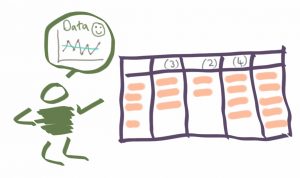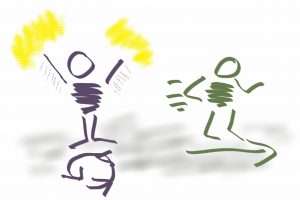Steve, Tobbe and I were discussing actions and the differences between working in efficient ways and working in expedient ways.
Efficient is a non-judgemental word and rather clinical – are we working in ways that reduce or eliminate the waste of resources, effort, time and money?
Expediency has a moral element – doing things in ways that are convenient regardless of whether they are morally the right things to do.
I did not notice my attitude to visual management changing – it struck me only recently. When I first started to work with cards on the wall, I thought it was about accountability. I would feel awful if I pointed to a card that I said I would finish yesterday and I still had not completed it today. Now I feel fine using cards on the wall to see how the work is flowing. It gives me ways to capture data and articulate where the workflow is being impacted. The focus is not on me and my accountability (there are plenty of other ways to look after that in the workplace) – the focus is on how we can make the system of work flow better.
Getting back to the words – expedient and efficient. Kanban-style visual management is a very efficient way to visualise the work in order to improve it, it allows us to see queues of work that are otherwise invisible. I have also heard horror stories of it being used to victimise people – it is an expedient tool in that respect. Someone could stand at the board, point at a card and interrogate the team about who is working on it, why it has not moved and yelling could happen. Unfortunately expediency also often includes efficiency.
Because I had not noticed the change in my attitude, I am careful to explain the difference when speaking to others who are new to visual management – it is likely that they may be feeling the accountability side just as I did at first.


